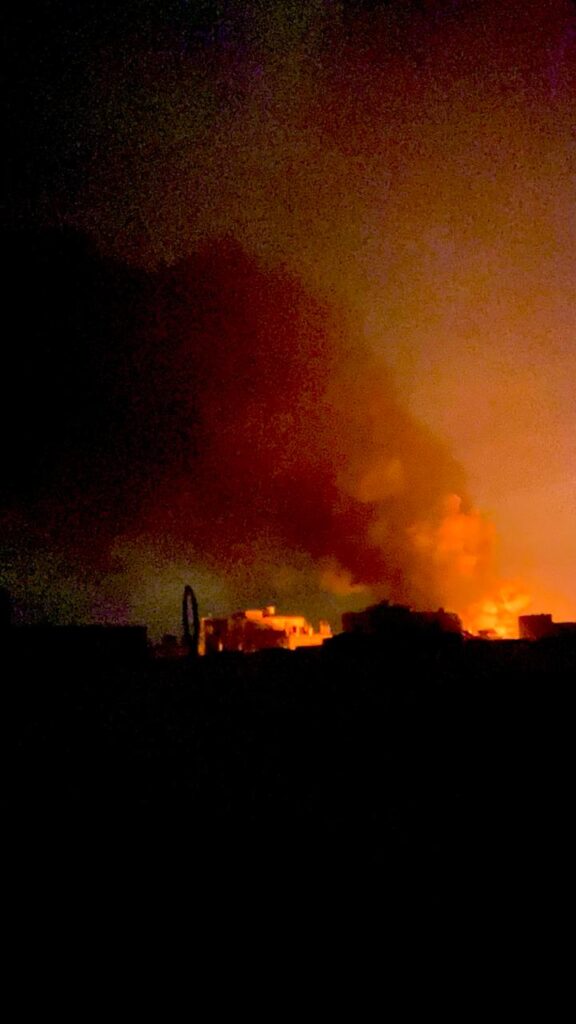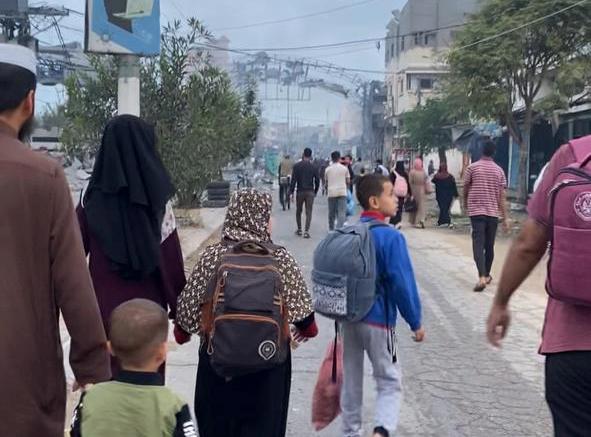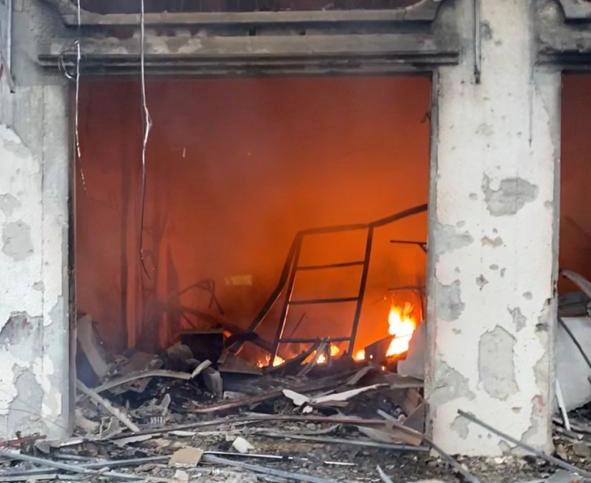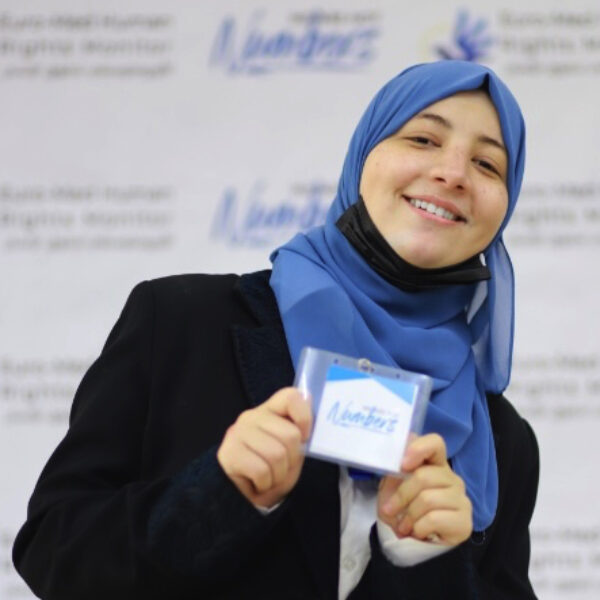Having stepped beyond Gaza’s borders, I’m compelled to narrate the haunting tale of a night that unfolded months ago, on the 9th of October, when the war unleashed its relentless fury upon us, marking the day we saw death 64 times. Abassan — a once calm, rural haven — was marred by chaos. Amid the shattered glass windows, our collapsed kitchen roof, and the second floor strewn with debris, I sought solace in a hobby of mine — vlogging — to document the challenges we faced. We laughed into the lens, and I asked my family members for their last messages in case we succumbed that night. Survival was uncertain, and laughter merely masked our fear. I wondered if that night was the pinnacle of horror or merely a precursor of more terrifying nights to come.

That night, the relentless “fire belt” bombing spanned six agonizing hours, signaling a plan for complete annihilation. I reflexively covered my little brother’s ears in response to each new airstrike. The sky glowed crimson, the air reeked of gunpowder, and our once-peaceful haven was now enveloped in smoke, which shrouded everything, an ominous specter of devastation that left us disoriented and clueless.
At 4 a.m., it seemed as though the onslaught had ceased. Despite the lull, the fear of losing someone lingered, preventing us from shutting our eyes. My stomach churned, and my heart felt displaced, as if my insides had shifted. I hesitated to even go to the bathroom, paralyzed by a lack of courage.
Suddenly, my mom sprinted to the bathroom sink, succumbing to fear-induced nausea. I went to check on her and was met with an unexpected sight through the bathroom window: a sky of orange hues. A sense of impending doom washed over us. I shouted for everyone to take cover, and in an instant, the entire house quivered from its foundation to its peak; a gust of wind followed, and a resounding blast. Words fall short in conveying the magnitude of that moment.
Sixteen consecutive airstrikes echoed, each one intensifying our confrontation with death. A lingering sense that this might be our final gathering hung in the air. We dialed everyone we knew. Seven more airstrikes followed and an abrupt disconnection of the line extinguished any hope of communication.
I had been filming the night, and I kept the camera rolling, documenting every moment in case the worst happened. My earnest desire was to unveil the inhumane reality we endured, a reality no human should be subjected to. Throughout the night, darkness enveloped us, amplifying our apprehensions — we avoided light for fear of attracting the drones that were buzzing all night, a chilling addition to our already profound fear of losing sight of each other in the obscurity.
At 5:30 a.m., the strikes began again without respite. My cousin called and informed us that as soon as the sun rose, people in the vicinity would evacuate. Despite our reluctance to step into a world rained upon by death, the urgency to move prevailed — we couldn’t stay put, otherwise death would find us.

As we took turns praying Fajr, the idea of venturing out weighed on our minds, especially with the damaged state of our house and the exodus of people all around. While we waited for the sun to rise, we huddled together, covering our ears to shield ourselves from the bombs, sharing stories of my little brother’s bravery during the night, discussing which kinds of simple meals might bring comfort to the frightened children in our midst.
Out of the blue, my cousin called, shouting that the Red Cross would arrive in just 15 minutes. “Get out and run,” he urged, though outside, bombings continued unabated. Stunned, I asked “How on Earth are we supposed to move?” Dad grappled with the weight of responsibility, gathered his resolve, and encouraged us. “Let’s believe everything will be all right. Everyone, grab your bags, and let’s go now.”
My uncles lived in the same neighborhood but hadn’t yet emerged. As we discussed whether to retrieve them, a nearby explosion thwarted our conversation. In haste, I ushered my younger brother and sister to seek shelter, crouching in the open with our hands behind our necks. I prayed and pleaded for everyone’s safety. Eventually we reached the main street where many people — kids, men, women, and the elderly — were in the process of evacuating.

We called everyone we knew, but we lost service before we were able to reach anyone. It was now six a.m. Picture walking in the early morning after a night without sleep, in a terrifying environment, lugging a heavy backpack and a mini suitcase. They had been packed in case of emergency, and contained a change of clothes, daily necessities, and a book to read — a choice that now seemed impractical. The wheels of our luggage were jammed with shrapnel and the streets were dotted with fires everywhere. It was disheartening to realize this was once my hometown. We walked on aimlessly, unsure of our destination or the whereabouts of anyone we knew.
Mom finally had reception and called a relative with a car, and asked him to meet us at the intersection point of Bani-Suhaila. I wanted to give up, my legs exhausted from two hours of continuous walking. That’s when a child ran past, their leg in a cast. Seeing them propelled me to continue. We passed a bakery selling bread, and we bought some, uncertain if we’d find any later. Finally, we hopped into my relative’s car. I don’t know how it accommodated all seven of us and our luggage, but it did. We decided to head to my grandpa’s friend in Khan Younis, and called them so we wouldn’t arrive unannounced. Unfortunately, we couldn’t reach them by phone, but when we arrived, they offered us a warm and welcoming refuge in their house.
We shared their two-room space — my family of seven and their family of six. Deprived of internet, electricity, and water, what kept me going was the realization that our situation, though challenging, was comparatively better than those enduring life in schools and on the streets. Later we received news of the bombing at Rafah border, where aid was intended for Gaza. Uncertainty clouded our thoughts, leaving us clueless about what lay ahead.
I never envisioned that this ordeal would extend to today, but here we are, survivors determined to endure. Our faith in life and the world has been shattered, but in the midst of broken faith, we find strength to rebuild, to forge ahead with the belief that there is a brighter tomorrow waiting beyond the shadows of betrayal.
This essay was written in Cairo, Egypt, and first published by the journal Agni.









